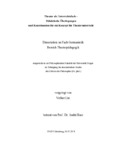Citation link:
https://nbn-resolving.org/urn:nbn:de:hbz:467-13353Files in This Item:
| File | Description | Size | Format | |
|---|---|---|---|---|
| Dissertation_Volker_List.pdf | 14.73 MB | Adobe PDF |  View/Open |
| Dokument Type: | Doctoral Thesis | metadata.dc.title: | Theater als Unterrichtsfach : didaktische Überlegungen und Konstituenten für ein Konzept für Theaterunterricht | Other Titles: | Theatre as a subject : didactic considerations and constituents for a concept for theatre teaching | Authors: | List, Volker | Institute: | Fakultät I Philosophische Fakultät | Free keywords: | Theaterunterricht, Theater, Didaktik | Dewey Decimal Classification: | 792 Theater, Tanz | GHBS-Clases: | IIC KMT |
Issue Date: | 2018 | Publish Date: | 2018 | Abstract: | Geht man von der Annahme aus, dass Theaterspielen eine bildende Wirkung für den Menschen hat und ein wesentlicher Bestandteil kultureller und ästhetischer Entwicklung von Menschen ist, dann stellt sich aus bildungspolitischer Sicht die Frage, ob Theaterspielen fester Bestandteil eines staatlichen Bildungsangebotes für alle Schüler sein sollte. Aus didaktischer Sicht stellt sich die Frage, in welcher Weise dieses Theaterspielen als Unterrichtsfach Theater/ Darstellendes Spiel in den schulischen Kontext integriert und strukturiert sein sollte. Dabei sind folgende zentrale Fragen zu beantworten: • Was sollten die Inhalte des Theatermachens bzw. Theaterspielens im Unterricht sein? • Wie sollte das Theatermachen bzw. Theaterspielen unterrichtet werden? • Welche theoretischen Überlegungen gehen einem Konstrukt und einer Strukturierung eines Unterrichtsfaches Theater/ Darstellendes Spiel voraus? • Welche Impulse und welches Material scheinen geeignet, Schüler in eine Theater-Praxis zu führen, die sie gleichermaßen lernen kompetent zu reflektieren? Die folgende Untersuchung versucht über die Beantwortung dieser Fragen die Lücken, die sich in der Analyse des Forschungsstandes zeigen, zu schließen und den Diskurs mit einem eigenen Konzeptentwurf für Theaterunterricht anzuregen und weiterzuführen. Mit dem Konzeptentwurf wird aus didaktischer Sicht ein theatrales Lernangebot für Schüler gemacht, das sie befähigen soll, Theatralität als kulturbildendes Element in Kunst und Alltag sensibler wahrzunehmen, ihre Funktionsmechanismen zu erkennen und selbst zu erproben. Durch die Arbeit in ästhetischen Prozessen sollen sie kompetenter im Zuschauen werden und ihre Wahrnehmung schulen und lernen, qualifiziert darüber zu reflektieren und sich mündlich und schriftlich angemessen dazu zu äußern. Sie können lernen theatrale Vorgänge in ihrer Zeichenhaftigkeit, ihrer Performativität und sinnlichen Qualität zu erkennen und zu beschreiben. If one starts from the assumption that theatre plays have an educational effect on people and are an essential component of cultural and aesthetic development of people, then from an educational policy point of view the question arises whether theatre plays should be an integral part of a state educational offer for all pupils. From a didactic point of view, the question arises as to how this theatrical acting should be integrated and structured in the school context as a teaching subject. The following key questions need to be answered: - What should be the contents of making and playing theatre in class? - How should theatre making and acting be taught? - Which theoretical considerations precede a construct and a structuring of a subject theatre/performing arts? - Which impulses and which material seem suitable to lead students into a theatre practice, which they learn to reflect competently in equal measure? By answering these questions, the following study tries to close the gaps that appear in the analysis of the state of research and to stimulate and continue the discourse with my own conceptual design for theatre lessons. From a didactic point of view, the concept design offers theatrical learning for students, enabling them to perceive theatricality as a culture-forming element in art and everyday life more sensitively, to recognize its functional mechanisms and to try them out for themselves. By working in aesthetic processes, they should become more competent in watching and train their perception and learn to reflect on it in a qualified manner and to express themselves appropriately both orally and in writing. They can learn the theatrical processes in their symbolic quality, their performativity and sensual quality. and to describe them. |
URN: | urn:nbn:de:hbz:467-13353 | URI: | https://dspace.ub.uni-siegen.de/handle/ubsi/1335 | License: | https://dspace.ub.uni-siegen.de/static/license.txt |
| Appears in Collections: | Hochschulschriften |
This item is protected by original copyright |
Page view(s)
4,312
checked on Dec 1, 2024
Download(s)
9,580
checked on Dec 1, 2024
Google ScholarTM
Check
Items in DSpace are protected by copyright, with all rights reserved, unless otherwise indicated.

